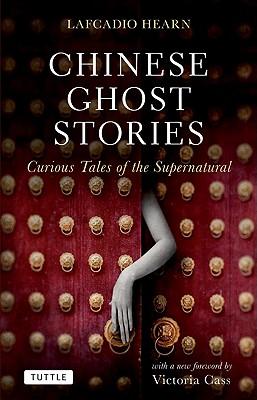 Translated and adapted a century ago by Lafcadio Hearn (a “thief of myth”), this is a collection of six traditional Chinese folk tales.
Translated and adapted a century ago by Lafcadio Hearn (a “thief of myth”), this is a collection of six traditional Chinese folk tales.
In simple, unaffected writing, we are presented with ghosts and spirits that are benign and helpful. These are stories about loyalty: to kin, to the gods, to the Emperor, even to mundane things like one’s craft or profession. Western ghost stories frighten, Eastern ghost stories inspire.
“The Soul of the Great Bell” tells of a mighty bell, commissioned by the Emperor, designed to be so loud that it could be heard 30 miles away. Its construction is plagued with difficulties. Each time it is cast, the metals crack and fissure, and the lips slag and split asunder. With the project failing, and the Emperor’s anger mounting, the chief bellmaker’s daughter Ge-Ai sacrifices herself to the foundry furnace, for only through the flesh of a maiden can the bell be made. It is said that the tolling bell had the sound of Ge-Ai’s voice. People live such short lives, and I wonder if that’s the reason long-lasting things like buildings and bells are sometimes considered halfway-houses to the supernatural.
“The Return of Yan Zhenjing” is a violent, warlike piece, set during the Tang Dynasty. Li Xilie, “a soldier mighty for evil“, is tearing the realm apart, and Supreme Judge Yan Zhenjing is sent to bring the rebel back to the Emperor’s side. Xilie first tries to break Zhenjing (and fails), tries to woo him (and fails), and tries to kill him (and succeeds), but Zhenjing’s defiance and courage sucks the sweetness from the act. War against Xilie is rejoined, but Zhenjing’s ghost finds a way to return to the Emperor. “Son of Heaven, the mission confided to me I have performed; and thy command hath been accomplished to the extent of thy humble servant’s feeble power. But even now must I depart, that I may enter the service of another Master.”
All the stories entertain, but Lafcadio’s most powerful find is “The Tale of the Porcelain God.”
It is superficially similar to “The Soul of the Great Bell”, but with a disturbing and neurotic edge. Master porcelain maker Bu is given the task of creating porcelain with the texture of flesh. His job consumes him to an extent that is terrible to witness even through the pages of a book. He works tirelessly, but failure piles up on failure. Soon, he realises that the ultimate sacrifice may be required, and he makes this sacrifice without a look back. The ending is not triumphant but understated and maybe even a bit mocking, the Emperor’s porcelain does not seem worth the price Bu paid. An afterword by Hearn makes the story even more troubling.
“The Emperors of China are, during their lifetime, the most redoubted of divinities, and they believe that nothing should ever stand in the way of their desires. It is so related that once upon a time a certain Emperor insisted that some porcelains should be made for him according to a model which he gave. It was answered that the thing was simply impossible: but all such remonstrances only served to excite his desire more and more…The officer charged by the demigod to supervise and hasten the work treated the workmen with great harshness. The poor wretches spent all their money, took exceeding pains, and received only blows in return. One of them, in a fit of despair, leaped into the blazing furnace, and was instantly burnt to ashes. But the porcelain that was being baked there at the time came out, they say, perfectly beautiful and to the satisfaction of the Emperor. From that time, the unfortunate workman was regarded as a hero; and his image was made the idol which presides over the manufacture of porcelain.”
This is a powerful and interesting collection. My only comment is that I wish these tales had a Chinese teller. We see them the way the author wants us to see them, and there’s always the question: is this is a story from China…or a story from Lafcadio?
No Comments »
Comments are moderated and may take up to 24 hours to appear.
No comments yet.
